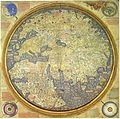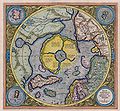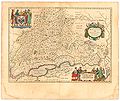Talk:Tsardom of Russia
| This is the talk page for discussing improvements to the Tsardom of Russia article. This is not a forum for general discussion of the article's subject. |
Article policies
|
| Find sources: Google (books · news · scholar · free images · WP refs) · FENS · JSTOR · TWL |
| Archives: 1, 2, 3Auto-archiving period: 12 months |
| This It is of interest to the following WikiProjects: | ||||||||||||||||||||||||||||||||||
| ||||||||||||||||||||||||||||||||||
| This article has previously been nominated to be moved. Please review the prior discussions if you are considering re-nomination.
Discussions:
|
What kind of Russia in 17 century
[edit]At that time there was no Russia it was Moskovia. Only at the begining of 18 century their tsar (Petter the Great) decided that they need better history and renamed Moskovia into Russia. Even at all European maps the territory is called Moskovia and full stop. Only in 18 century in German maps apears Russia. Before that there was one name "MOSKOVIA" --Vovchyck (talk) 11:08, 27 February 2011 (UTC)
- Wikipedia:Fringe theories or Ukrainian Nationalist Bullshit (UNB). These historical maps illustrate your lies:
-
Карта венецианского монаха Фра Мауро, 1475 г. (ориентирована с юга на север)
-
Carta Marina Олафа Магнуса, 1539 г.
-
"RVSSIA". Карта Ортелия, 1575 г.
-
Карта Европы, Меркатор, 1589 г. "Russia Moscouia" - Московская Русь
-
Карта азиатской части России, Меркатор, 1594 г.
-
Карта Северного полюса, Меркатор, 1623 г.
-
Карта Руси, Дженкинсон, 1598 г.
-
Карта России, в просторечии Московия (Tabla Russiae vulga Moscovia), Космография Блау, Голландия, 1645 г.
--Voyevoda (talk) 13:48, 27 February 2011 (UTC)
- This is interesting, did anybody actually look at those maps? the one for example from 1539 only has Russia Alba (White Russia) and lists Moscovia for the name of the country this discussion is about; the 1589 map has Moscovia written all over it, even the last one from 1645 says vulgo (commonly known as) Moscovia.--Termer (talk) 05:58, 11 June 2011 (UTC)
- Yeah, these maps are basically the purest example of Original Research. And some of those are still in the article, without any actual academic sources to elaborate on the meaning of the maps. Hence we don't know whether these maps refer to a sovereign state or to a region in Europe. Fatty Strider (talk) 13:01, 11 January 2023 (UTC)
- This is interesting, did anybody actually look at those maps? the one for example from 1539 only has Russia Alba (White Russia) and lists Moscovia for the name of the country this discussion is about; the 1589 map has Moscovia written all over it, even the last one from 1645 says vulgo (commonly known as) Moscovia.--Termer (talk) 05:58, 11 June 2011 (UTC)
Name section
[edit]This edit comes across as POV pushing with dubious reasons for restoring. As is known, Rosiya/Rossiya was "officially" used earlier. See [1] for example. Not to mention it contradicts the rest of the section. Mellk (talk) 19:54, 6 May 2023 (UTC)
- What do you mean by “‘officially’” in quotation marks? Can you support that with an actual citation, or maybe a quote? Just the name of a 300-page book isn’t very helpful for those of us who haven’t yet found time to visit a library and read the whole thing.
- Please curb your accusations.
- My addition is supported by quoted sources. What looks like POV-pushing is a series of reverts fishing for a rationale that will stick, without actually bothering to consider the content and supporting reference:
- The article’s current text is not NPOV, because it bizarrely derives Great Russian Tsardom from Tsar i Velikiy knyaz vseya Rusi (“tsar and grand prince of all Rus”) in a previous sentence. This addition is good, but obviously the section can benefit from further improvement. —Michael Z. 15:41, 8 May 2023 (UTC)
- Your first quote is the "Latinate Rossiya was not formally adopted" and your second quote is "Muscovy (which would be renamed "Russia" by Peter I)". What you wrote is synth. Moreover, it is misleading. The official name of the state in 1721 was Rossiiskaia Imperiia. Rus' in Russian was transformed into Rus(s)iya or Ros(s)iya around the 15th century. "The Russians themselves called their country, in the language of the Eastern Slavs, Rus' or ruskaya zemlya... The term Ρωσία was borrowed by the Russians, in the form Rosiya."[1] In the title of Ivan IV he was tsar of "всеѧ̀ рꙋ́сїи". "Officially" is misleading, for example:
- "The formula 'to all his state of Great Russia' in this preamble replaces that found in other manuscripts -- 'to all the Russian realm' (vo vse Rossisskoe tsarstvo). The former is more typical of the seventeeth century, when the use of the expression 'Great Russia' (Velikaia Rossiia) became widely established".[2]
- "Standing before his throne on the dais, Fedor proclaimed that all "Great Sovereigns" of "all Great Russia" (Velikaia Rossiia), the word Rossiia having replaced the word Rus' to describe the extent of he tsar's imperial authority in seventeeth-century chiny. Fedor's chin went a step further and referred to the Great Russian Tsardom, Velikorossisskoe Tsarstvie, a term denoting an imperial, absolutist state, subordinating Russian as well as non-Russian territories". [3]
- Also, you should already know that when your edit is challenged, you should not start an edit war over it, and it reflects poorly.
Mellk (talk) 21:57, 8 May 2023 (UTC)
Semi-protected edit request on 6 June 2023
[edit]This edit request has been answered. Set the |answered= or |ans= parameter to no to reactivate your request. |
The personal standard of Peter the Great should be replaced by the flag of the Russian Tsardom. The false flag of the Russian Empire should be removed from the chronological reference: '6. What is the flag of Russian merchant ships. - Russian merchant ships should have a striped flag of three colors: white, blue, red. "- Naval charter of the Russian Empire, January 24, 1720. Eugene of Russia (talk) 14:19, 6 June 2023 (UTC)
 Not done: No explanation on why the changes need to be made. Lightoil (talk) 02:48, 8 June 2023 (UTC)
Not done: No explanation on why the changes need to be made. Lightoil (talk) 02:48, 8 June 2023 (UTC)
Semi-protected edit request on 8 September 2023
[edit]This edit request has been answered. Set the |answered= or |ans= parameter to no to reactivate your request. |
@Flags and Geography: It looks like you may have misformatted your edit request in a way that caused it to not be added. If you would like to reopen the edit request, please set answered=no in the template above and reply to this message with your request. Tollens (talk) 01:16, 8 September 2023 (UTC)
Requested move 9 September 2023
[edit]- The following is a closed discussion of a requested move. Please do not modify it. Subsequent comments should be made in a new section on the talk page. Editors desiring to contest the closing decision should consider a move review after discussing it on the closer's talk page. No further edits should be made to this discussion.
The result of the move request was: not moved. (closed by non-admin page mover) – MaterialWorks 17:50, 18 September 2023 (UTC)
Tsardom of Russia → Russian Tsardom – "Russkoye Tsarstvo" is corroborated by every major source as the closest the government had to a single official name, "Russian Tsardom" would be the accurate translation here (i. e. the adjective-noun form rather than the noun-of-noun form, "Tsardom of Russia" would be "Tsarstvo Rossiye" instead) Orchastrattor (talk) 19:52, 9 September 2023 (UTC)
- Move to Tsardom of Muscovy, which is very widely used.[5] Of course, just Muscovy is by far the most WP:COMMONNAME,[6] but as we have split the subject we have to disambiguate from the Grand Duchy of Moscow. See also Talk: Grand Duchy of Moscow#Requested move 19 August 2023. —Michael Z. 17:10, 10 September 2023 (UTC)
- You included "Muscovy", which has a broader meaning than a state between the years 1547–1721, but conveniently left out "Russia". So, again, no demonstration that it is the common name. Mellk (talk) 18:19, 10 September 2023 (UTC)
- Muscovy was a state between the years 1282 and 1721 (I had thought it was 1286, but whichever). We have it split between two articles, apparently because its ruler declared himself tsar at one point. So we need to disambiguate. Russia is a much, much broader name, referring to subjects of many more articles. Muscovy better serves the WP:CRITERION of precision. —Michael Z. 19:34, 10 September 2023 (UTC)
- Hence the article is currently called "Tsardom of Russia", which satisfies precision, because the title of tsar was used during those years before it became emperor. Mellk (talk) 19:37, 10 September 2023 (UTC)
- Muscovy was a state between the years 1282 and 1721 (I had thought it was 1286, but whichever). We have it split between two articles, apparently because its ruler declared himself tsar at one point. So we need to disambiguate. Russia is a much, much broader name, referring to subjects of many more articles. Muscovy better serves the WP:CRITERION of precision. —Michael Z. 19:34, 10 September 2023 (UTC)
- You included "Muscovy", which has a broader meaning than a state between the years 1547–1721, but conveniently left out "Russia". So, again, no demonstration that it is the common name. Mellk (talk) 18:19, 10 September 2023 (UTC)
- Oppose, we don't translate names here, but you the most common one, there is no substantial difference between both names proposed in terms of popularity in academic texts, so there is no reason to make a move for the sake of it. Plus the current is consistent with the most popular format used in similar article names. Marcelus (talk) 17:51, 10 September 2023 (UTC)
- Oppose per above. I don't see a good reason to move. The monarch was the tsar of Russia and typically the format is "tsardom of x" like "Kingdom of x", so it is more consistent. Mellk (talk) 18:25, 10 September 2023 (UTC)
- Oppose. The current title is fine. Rreagan007 (talk) 19:49, 10 September 2023 (UTC)
- C-Class level-4 vital articles
- Wikipedia level-4 vital articles in History
- C-Class vital articles in History
- C-Class Russia articles
- Top-importance Russia articles
- Top-importance C-Class Russia articles
- C-Class Russia (history) articles
- History of Russia task force articles
- C-Class Russia (human geography) articles
- Human geography of Russia task force articles
- WikiProject Russia articles
- C-Class European history articles
- High-importance European history articles
- All WikiProject European history pages












